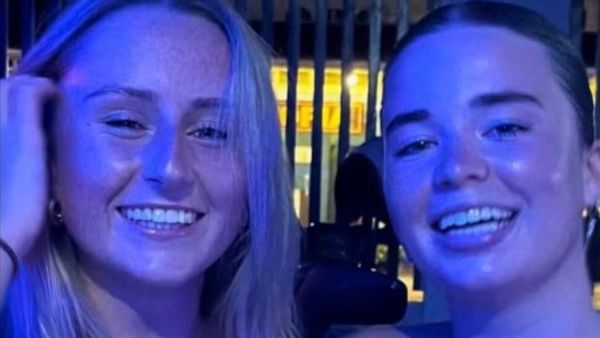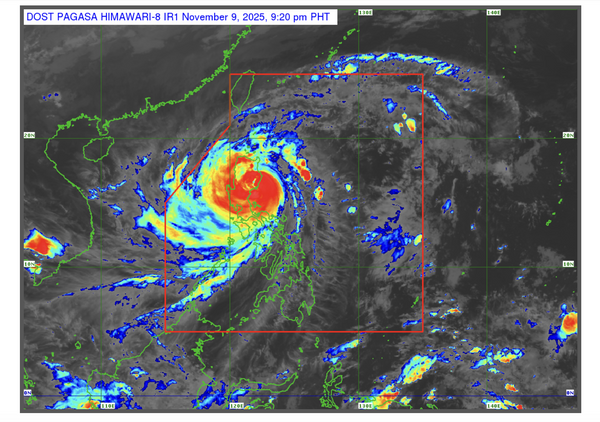Summary of the day
Ireland’s Leo Varadkar, has announced he is standing down as leader of the Fine Gael party and will also step down from his role as prime minister as soon as a replacement is selected by his party.
The Irish leader’s decision comes after the government’s crushing defeat in a dual referendum.
His departure also comes only 10 weeks before European parliamentary and local elections and less than a year before Ireland’s next general election.
“After seven years in office, I don’t feel I’m the best person for that job anymore,” Varadkar said in an emotional speech.
He also said he would recommend a career in politics, adding however that “politicians are human beings and we have our limitations. We give it everything until we can’t anymore. And then we have to move on.”
Fianna Fáil’s Micheál Martin, who serves as Ireland’s foreign minister, said following the announcement that he believes governments should finish their full term.
Mary Lou McDonald, the leader of Sinn Féin, called for a new general election.
Seán Kelly, leader of Fine Gael in the European parliament, said that he is “both surprised and disappointed” that Varadkar decided to step down, adding that “Leo commands huge respect internationally.”
We are now closing this blog but you can read our report on Leo Varadkar’s shock resignation announcement here.
Updated
Seán Kelly, leader of Fine Gael in the European parliament, has said that he is “both surprised and disappointed” that Leo Varadkar has decided to resign.
“Leo commands huge respect internationally for his leader, his intelligence his commitment, and his bravery,” he wrote, adding that “he is an enormous loss to Fine Gael and to Ireland, but he leaves behind a great legacy.”
My statement on the resignation of Taoiseach @LeoVaradkar 👇 pic.twitter.com/O1vTe1yUvl
— Seán Kelly MEP (@SeanKellyMEP) March 20, 2024
Speculation about reasons for Leo Varadkar’s decision to step down zinged around Dublin but one thing was clear: he had delivered a political blitz that probably would have won the approval of one of his heroes, Otto von Bismarck.
This was not a typical end: despite losing two constitutional referendums earlier this month there was no visible pressure to quit, no evident palace coup intrigues.
But then Varadkar was never a typical Irish politician.
The gay son of an Indian immigrant, a trained medical doctor, and socially awkward, the taoiseach did not fit the traditional Irish political mould – and despite a glamorous international image at home he was never hip, and didn’t claim to be.
Varadkar studied medicine at Trinity College Dublin and joined Fine Gael, a centre-right party. Outspoken about tax cuts and welfare reform, some called him “Tory boy”. In addition to Germany’s Iron Chancellor he revered Ryanair’s Michael O’Leary.
In 2015 he announced he was gay. “It’s not something that defines me,” he told RTÉ. “I’m not a half-Indian politician, or a doctor politician or a gay politician for that matter. It’s just part of who I am.”
Sinn Féin leader calls for new election in Ireland
Mary Lou McDonald, the leader of Sinn Féin, has called for a new general election in Ireland.
The next Taoiseach should be chosen by the people, not by the Fine Gael parliamentary party.
— Mary Lou McDonald (@MaryLouMcDonald) March 20, 2024
There needs to be a General Election
It's time for change! #GeneralElectionNow pic.twitter.com/pweMqbFuIY
Updated
Watch back Leo Varadkar’s emotional announcement here.
The leader of the centre-right European People’s party, Manfred Weber, has thanked Leo Varadkar “for the enormous contribution that you have made to Fine Gael, to Irish and European politics.”
Dear @LeoVaradkar, as Taoiseach and leader of @FineGael, you have led with great vision and integrity. You are a valued member of our @EPP family and we thank you for the enormous contribution that you have made to Fine Gael, to Irish and European politics.
— Manfred Weber (@ManfredWeber) March 20, 2024
UK Prime Minister Rishi Sunak’s spokesperson has described Ireland as “vital partner” for the UK, in some of the first reaction from other European capitals.
“The Prime Minister has worked closely with Mr Varadkar and he wishes him well in his next steps,” said the Number 10 spokesman, who said that Britain would work with his successor.
Relations between Varadkar and Sunak have not always been smooth sailing however and the two have clashed over Britain’s plans grant an effective amnesty for those accused of killing or maiming people during the conflict in Northern Ireland.
In a call between the two men, Sunak strongly criticised Varadkar for Ireland’s case against the UK’s legacy act, when they spoke to discuss a breakthrough which restored Northern Ireland’s devolved administration at Stormont.
Updated
Fianna Fáil’s Micheál Martin, who serves as Ireland’s foreign minister, said following Leo Varadkar’s announcement that he believes governments should finish their full term.
“That creates stability, it avoids short-term decision making and it gives a better policy focus than a short-term electoral run,” he said, RTE reported.
“That is why I’ve been absolutely steadfast and consistent on this since the beginning of this government that it should go full term and that remains my position.”
Leo Varadkar’s surprise resignation will inevitably lead to speculation that he has his eye on an EU job.
But in the traditional carve up, all the top jobs have already been assigned to different political groupings and Varadkar’s group - the centre right European People’s Party is already more or less guaranteed the European Commission presidency after its incumbent Ursula von der Leyen announced she was going for a second term.
The socialists are expected to take the president of the European council role with the Renew group of liberal parties, which includes Emmanuel Macron’s party expected to take the chief diplomat role currently occupied by Josep Borrell.
Updated
'Politicians are human beings and we have our limitations,' Varadkar says in emotional speech
In his statement announcing his resignation, Leo Varadkar said it’s time to move on.
I’ve learned so much about so many things, met so many people who I’d never have got to meet, been to places I would never have seen both home and abroad.
And I am deeply grateful for it – and despite the challenges, would wholeheartedly recommend a career in politics to anyone who’s considering it.
However, politicians are human beings and we have our limitations. We give it everything until we can’t anymore. And then we have to move on.
Varadkar also said he has nothing lined up and no definite plans but he is “really looking forward to having the time to think about them.”
Updated
'I don’t feel I’m the best person for that job anymore', Varadkar says
In his statement, Leo Varadkar said “there’s never a right time to resign high office. However, this is as good a time as any.”
He added:
The new taoiseach will have a full two months to prepare for local and European elections, and up to a year before the next general election.
My reasons for stepping down are both personal and political.
I believe this government can be reelected, and I believe my party Fine Gael can gain seats in the next Dáil.
Most of all, I believe the reelection of this three-party government will be the right thing for the future for our country, continuing to take us forward, protecting all that’s been achieved and building on it.
But after careful consideration and some soul searching, I believe that a new taoiseach and a new leader will be better placed than me to achieve that – to renew and strengthen the top team, to refocus our message and policies, and to drive implementation.
And after seven years in office, I don’t feel I’m the best person for that job anymore.
There are loyal colleagues and good friends contesting local and European elections. And I want to give them the best chance possible. And I think they have a better chance under a new leader.
Updated
“One part of leadership is knowing when the time has come to pass on the baton to somebody else, and then having the courage to do it,” Leo Varadkar said in an emotional statement.
“That time is now. So I am resigning as president and leader of Fine Gael effective today and will resign as taoiseach as soon as my successor is able to take up that office,” he said.
Updated
Irish leader Varadkar announces he is stepping down
Leo Varadkar has announced that he is stepping down as leader of Fine Gael effective today and will resign as taoiseach as soon as his successor is selected.
At a press conference, surrounded by some of his political allies, Varadkar said his reasons for stepping down are both personal and political.
Updated
Leo Varadkar is now speaking at a press conference. Stay tuned for details.
What’s been going on in Ireland?
The Irish political establishment has recently experienced a major defeat.
There were two simultaneous referendums, each designed to change parts of a constitution that was written in 1937 under Catholic church influence. Article 41 refers to the role of women in the home and defines the family as a unit based on marriage.
The government said the language was old-fashioned and did not recognise unmarried couples so it asked voters to endorse two changes. The family amendment would have widened the definition of family to include “durable relationships” and the care amendment would have replaced the reference to women in the home with a new provision recognising the role of carers.
What was the result?
A resounding no: 67% rejected the family amendment, versus 32% who voted yes, and 74% rejected the care amendment, versus 24% who voted yes. Turnout was 44%. It was a stunning defeat not just for the government but the entire political establishment. Sinn Féin and the other main opposition parties had supported “yes, yes” as did many institutions and advocacy groups.
Read the full explainer here.
Updated
The Irish Times reports that Leo Varadkar will stay on as taoiseach until a new leader is chosen by his party.
Updated
Leo Varadkar to step down as Ireland's leader: reports
Leo Varadkar is set to step down today as taoiseach and Fine Gael leader, according to multiple media outlets.
A press conference is expected soon.
#Breaking Leo Varadkar is set to step down as Taoiseach and Fine Gael leader https://t.co/MwxfzBCsgU
— RTÉ News (@rtenews) March 20, 2024
Updated
Ahead of this week’s summit, Ukraine’s deputy prime minister, Olha Stefanishyna, briefed EU countries’ representatives.
“Briefed on the steps Ukraine is taking to prepare for accession talks, screening process, & implementation of the reforms. We expect that the negotiation framework prepared by EU Commission will be adopted by EU leaders shortly,” she said.
Grateful to EU ministers and permanent representatives for having this exchange right after #GAC.
— Olga Stefanishyna (@StefanishynaO) March 20, 2024
Briefed on the steps Ukraine is taking to prepare for 🇪🇺 accession talks, screening process, & implementation of the reforms. We expect that the negotiation framework prepared by… pic.twitter.com/IZBejJsHEu
Polish farmers protest as leaders prepare to discuss agriculture
Farmers are blocking roads across Poland today.
Onet reports that farmers had announced protests in over 580 locations, with nearly 70,000 people estimated to be participating.
The EU leaders’ summit will be taking place as leaders are positioning themselves ahead of the June European elections. The inclusion of agriculture on the agenda, for example, is a nod to farmers’ protests and electoral concerns.
A Euronews/Ipsos survey published last night shows that support for the far right is rising across the EU, but that pro-European parties will still hold 63% of the seats in the European parliament.
🇪🇺 Rising support for the far right and a collapse for Greens and Liberals won’t change the fundamental MEP arithmetic after June elections, a groundbreaking Euronews/Ipsos survey has found.
— euronews (@euronews) March 19, 2024
The survey polled 26,000 people, in countries representing 96% of the EU population.
Updated
European Council president ahead of summit: 'we face a pivotal moment'
In a letter to the EU’s 27 heads of state and government, the European Council president, Charles Michel, outlined his priorities for a summit scheduled for tomorrow and Friday.
“Into the third year of Russia’s war of aggression against Ukraine, we face a pivotal moment. Urgency, intensity and unwavering determination are imperative,” he wrote, stressing that “our foremost task is the swift provision of military aid to Ukraine and, building on recent initiatives like that of Czechia, the fast-track procurement and delivery of ammunition to Ukraine.”
At the summit, leaders “must focus on effectively implementing and enforcing our sanctions, as well as advancing our efforts on the use of windfall profits from immobilised assets,” Michel said.
The European Council president also said that the summit will focus on defence, the Middle East and agriculture.
We must also help the defence industry access private and public funds, and reduce regulatory burdens and barriers. Building this strategic security mindset require strong leadership and an acute understanding of the urgency of the threats we face. I expect our European Council to live up to this.
Addressing the situation in the Middle East, he wrote:
The atrocities of the October 7th attacks and the ensuing war in Gaza have crossed the brink of inhumanity. Too many civilians have perished. Too many innocent lives are at risk because of the catastrophic humanitarian situation in Gaza and raging famine.
International law needs to be fully respected. A sustainable ceasefire is urgently needed to protect civilians, allow the hostages to return safely and ensure that humanitarian assistance can be delivered as needed.
With farmers’ protests continuing in different parts of the continent, Michel also touched upon the need to address concerns.
Our European farmers have voiced their concerns loud and clear. We need to act decisively on the challenges they face. This means taking stock of the work carried out so far and ensuring that progress is made without delay, particularly with regard to the position of farmers in the food supply chain and to fair competition, both within the internal market and globally.
Ahead of a crucial #EUCO, where our support to Ukraine will be at the heart of our discussions, I called President @ZelenskyyUa to reaffirm our full solidarity.
— Charles Michel (@CharlesMichel) March 19, 2024
In this critical moment on the battlefield, we must speed up our military assistance to the brave Ukrainian people.… pic.twitter.com/CdVjYiH2Zx
Updated
Welcome to the blog
Good morning and welcome back to the Europe blog.
Today we will be focusing on the latest debates and preparations for a summit bringing together the EU’s 27 heads of state and government, set to begin tomorrow in Brussels.
Send tips and comments to lili.bayer@theguardian.com.







